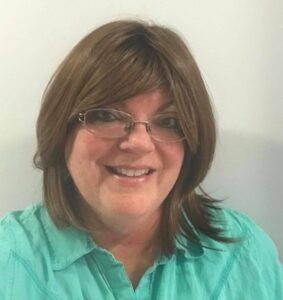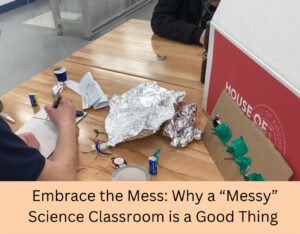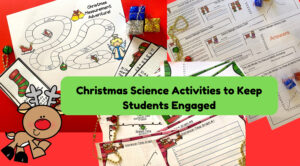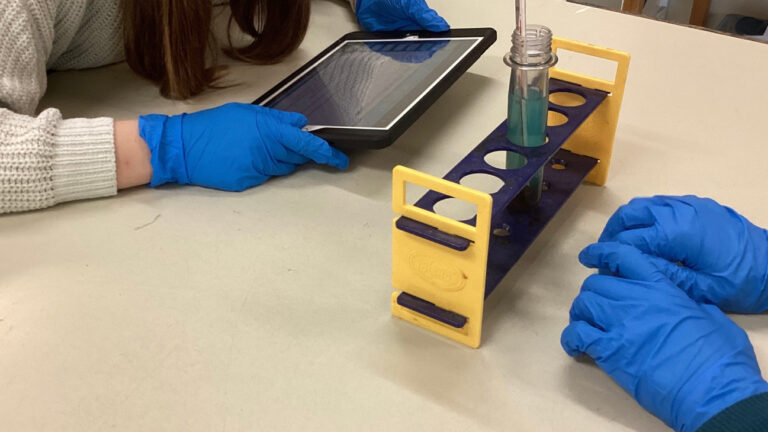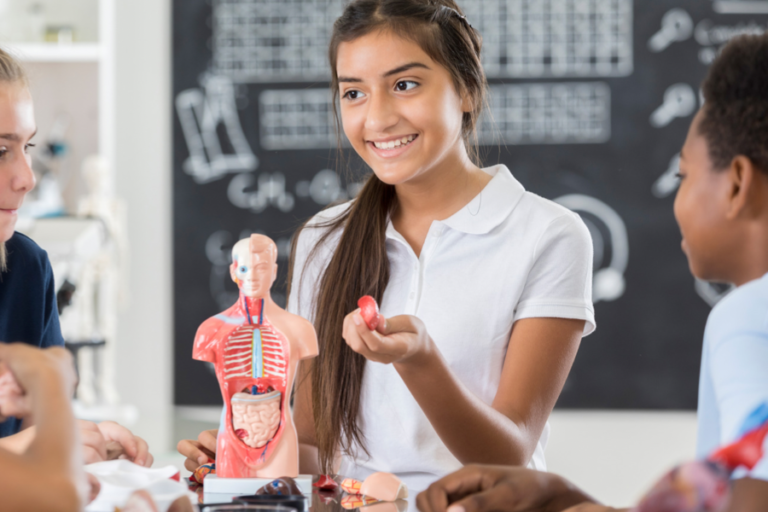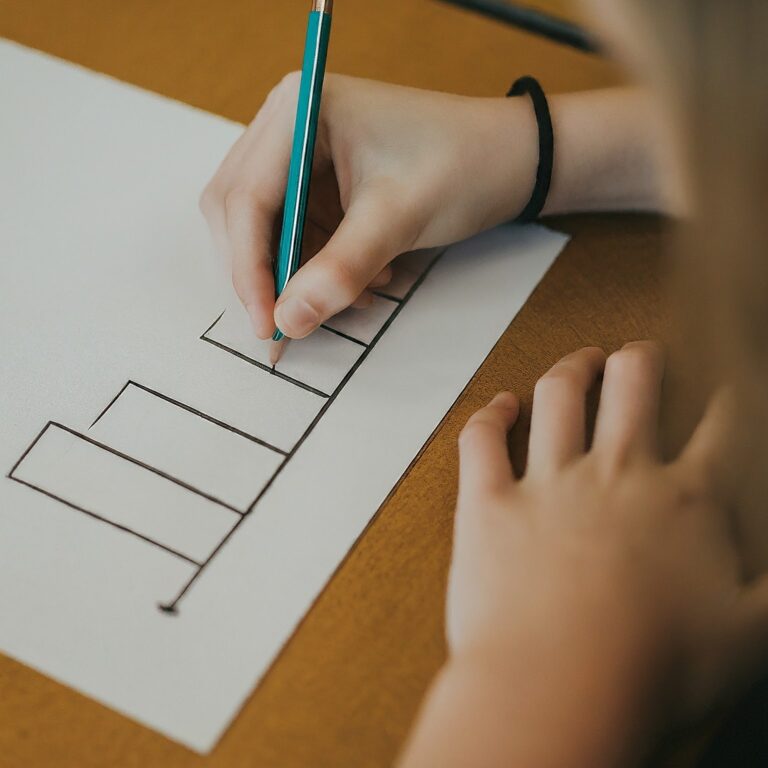Teaching Science Content Outside of Your Expertise
We often find ourselves facing the challenge of teaching science content outside of our expertise. If given the choice, we would probably avoid teaching them but we know that that’s not always feasible.

Teaching Science Content Outside of Your Expertise
April, 2024
Let’s overcome anxiety with action, and brainstorm ways to find out everything you need to feel comfortable teaching the new concept. Keep a good growth mindset because learning is something we never stop doing! We don’t want to ever feel stagnant. In reality, you are also modeling curiosity and perseverance for your students!
Break Down Complex Concepts
When you break down the new concepts into manageable chunks, you help yourself and your students. Use step-by-step examples and bring in real life examples to help make the ideas realistic and tangible for you. While researching and preparing, keep a notebook for brainstorming and outlining the key points. You’ll thank yourself later if you are asked to teach the new topic again.
I once taught an undergraduate college course for education majors on how to teach science. Although I had been teaching for 12 years at that point, actually teaching others how to teach was way out of my wheelhouse! I spent hours In the library, (yes, pre-internet), and put together a binder with tons of information. A few years later the college approached me and asked me to teach a graduate course with the same basic idea. I just pulled out that binder and refreshed it. So much less stress. I recently found that binder when I was preparing to move to another state and I could not bring myself to get rid of it!
What Resources Can You Use?
Those of us from the “dark ages“ remember teaching long before the internet was at our fingertips, let alone in our pocket on a phone! Researching new topics meant hours in the library looking up recent magazine or journal articles for up-to-date information. Nowadays, the information is overwhelming and there is the opposite problem of weeding through tons of unnecessary information to get to the good stuff. Let’s look at a few ways, on and offline to start your search for good references.
Utilize YouTube to Learn
We all do it. Need to fix the sink? Set up your phone? YouTube it! There are very few topics that are not covered on that platform. However, when dealing with scientific information, you need to use caution as to what sources are reliable and accurate. I have come across quite a few videos on YouTube, that have been made by students for school projects, that are loaded with misinformation. This is an important point to teach students as they do research. We all know that when you Google any topic, videos pop up early in the search. Many are valuable for learning new material.
What I particularly like about good, concept filled science videos, is clicking on the transcript at the bottom and taking screen shots for future reference.
While you are learning the material yourself, search for good 2 to 5 minute videos to show the students. I don’t like longer videos because it overwhelms the students and their eyes start to glaze over. I have also found it very helpful to turn on the closed captions to help students take notes.
I quite often show a difficult video twice. I have students sit quietly, with no notebook, for the first run through and then I give them a graphic organizer to fill out for the second viewing. It makes a huge difference!

Use Lots of Textbooks
Good old textbooks can certainly provide a strong foundation for your topic, particularly if you weren’t given one to follow. I still keep my college textbooks from years ago, for the fundamentals, but I look for inexpensive newer ones on Amazon or other used book sites. Having a high school or college level book gives you more than you need on your subject. This helps you better understand tricky topics and also answer most student questions.
That being said, there’s nothing wrong with telling your class that you don’t know the answer but you have a great upper level book to answer that super question!
The Big Fat Notebook
If you have been around any middle school science teacher in the last few years you have probably heard them rave about EVERYTHING YOU NEED TO ACE SCIENCE IN ONE BIG FAT NOTEBOOK. It basically covers every topic that should be covered in middle school science with lighthearted, whimsical illustrations and good content. It is a wonderful launching point to find out what you don’t know and what you need to further research.
I have a classroom set and the kids also really like them. they have nicknamed them the “chubby books”.

Use Teachers Pay Teachers
Teachers Pay Teachers can be an extremely helpful resource since the creators are teachers who have taught the topics you are needing.
Something that a lot of people might not realize is that when you sign up to make products for TPT, you must create a free product first and then you can add your paid products. Since the free product is so important as a “first impression” to the TPT world, teachers spent extra time making it strong. This means that there are loads of high quality free products for you to start with as you tackle the new concept.
After a while on TPT, you can focus on the stronger sellers who have well organized, student tested and thorough resources for you to purchase. Science by Sinai
You may even consider purchasing entire units that include a pacing guide, introductions, activities and even end of unit assessments. That can be a huge help when your time is limited.
Join Facebook Teacher Groups
Facebook groups with similar teachers are a great help. Struggling to find something difficult to teach such as “climate and global warming”? Need to cover a specific NGSS standard? Post a question asking how others teach it and within a few hours you have a wealth of information to work from. Nothing is as good as peer help!
Keep a Teacher’s Journal For Reference
Take notes after each session that you teach. Briefly jot down what seemed to go over well with the students. What area caused a lot of questions? Were the students attentive or dozing? What can you do next year to bring that area to life? A teacher journal is critical for keeping notes and ideas from year to year. I still love looking back at mine from many years ago. I had written all over the margins when I got an idea while in the shower or driving to work. (7 Reasons Why You Should Keep A Teacher Journal)
Brainstorm As Many Hands-On Activities as Possible
As much as possible, you should be bringing each topic to life with hands-on activities, particularly those that bring the concept into the students’ everyday lives.
For example, learning rocks can be dry even if you have some samples to show the students. Try having students bring in some rocks, from their own yards, and put them in a towel. Hit the towel with a hammer to break the rock open to see how different the inside is than the outside, which has been weathered. Right away it becomes a mystery and is very fun!
Tie rocks into student’s own lives by having them look for pictures of kitchen counters, buildings made of sandstone or limestone, pictures of diamond rings or other jewelry with stones, labels of vitamins with the minerals listed, and toothpaste with silica in the ingredients. Then have them go on a scavenger hunt in their house to find signs of minerals.
Use Games to Review
Gamification is a super way to have students retain information and enjoy coming to class. A bonus is you will also learn the material well while creating the games. Even a simple dice roll activity can keep an assignment dynamic and interesting. Matching sort cards can put some competition into learning vocabulary or concepts. Better yet, let the students make board games or quiz boards for each other! (Review Made Fun: Science Classroom Gamification)
Take the Students Outside
Very few science topics can’t be enhanced by going outside. Even if you simply teach in a circle outside, rather than in the classroom, you have made the lesson more memorable.
If you do go exploring, you will quickly find that the students have paid little attention to things such as plants struggling to grow in between cement slabs, seeds left behind by a hungry squirrel, or birds that are calling from two different sides of the playground.
Use a Variety of Assessments
I love using a project as my assessment after a unit, rather than a formal test. The students need to own the material to produce the project, so why test them again?
An example is my complete alien genetics project. The students have to decide the alleles of their aliens, create the dominant recessive traits, work out the genotypes and phenotypes, decide whether they are heterozygous or homozygous, cross with Punnett squares and then determine the probabilities. Boom! Unit concepts complete. Plus, they absolutely love creating their creatures!
Another example is my electrical circuit arcade game project. We learn basic circuits and a little about conductors and insulators before they begin. They then design working arcade games. Through a ton of trial and error, and some frustration, they REALLY understand the wiring of the project. Again, no testing needed.
Conclusion
As stated before, you can overcome anxiety with action every time! Utilize everything at your fingertips to grow your confidence little by little. Your comfort level will be projected to the students and, if you need to teach it again, it gets increasingly easier.
Organize your resources so they are at your fingertips when you need to quickly remind yourself of difficult concepts. Use this blog to help you cover the main middle school science units and enjoy the free resources as well. Strive to build up your unit, each time you teach it, and enjoy learning along with the students!


